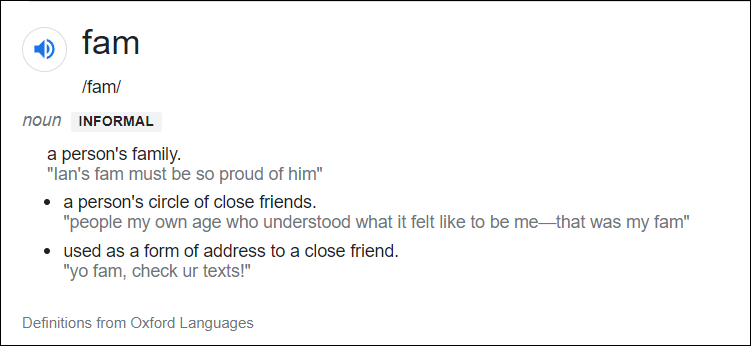FAM or fam, unlike most internet slangs, is not an acronym. It’s an abbreviation for the much-celebrated word and powerhouse – family. It began growing as a trend during the early 2000s and eventually branched into the social media universe as well. If we were in 2015 or 2016, ‘fam’ may have just been one of the popular slangs of the time.
Despite being in the English colloquial vocabulary for a substantial period, there is no definite origin story behind ‘FAM’. There are different speculations of the slang’s motherland, but we don’t know for sure where this inclusive term comes from. Regardless, it has smoothly made its way into our informal dialect.
What Does FAM Mean?

Blood may have water, but it is thicker, fam.
Though ‘fam’ is ‘family’ cut in half, it doesn’t mean blood family only. When we say ‘family’, we typically think of the place we come from. Our ancestry, our roots, the people we grew up with, the people who raised us, and the people we’re related to by blood — these are the typical connotations we have with family.
Unlike the dictionary meaning for ‘family’, the slang’s significance stretches far beyond the basic picture. Apart from the obvious, ‘fam’ also means belonging and translates to a community. It represents a circle you belong to, groups you share common interests with, a community you’re an active part of, or even external groups and communities.
While ‘fam’ is generally close circles and networks that are core to your social life, it also refers to extensions of the same. Larger circles that you may or may not be a part of are also ‘fam’. For example, your active internet groups, best friends, work community are ‘fam’ just as much a social media platform that you don’t use, your university, active/inactive online groups, are.
How to Use FAM?
Typically, ‘fam’ depicts a group (2 and more) of animate beings or inanimate things that mean something (or nothing) to the user. The nature of that ‘something’ determines the significance of this slang and its usage. A person can belong to a group or vice versa — most times, this connection overlaps and means the same. Like – ‘My dogs are fam much before of my human family, ugh.’ or ‘I’m a part of the fancy fam now, yo!’.
The concept and feeling of belonging to a group are voluntarily (like a fan club of your favorite show) or involuntarily (like a classroom with the majority of people who aren’t your type) driven. When you belong to a group, it is the consequence of random or specific selection — and both are ‘fam’. Like – ‘It feels SO great to finally have my own Indie fam!!’ or ‘My chemistry fam sucks, dude. FML’.
‘Fam’ creates an instant sense of belonging that can reflect genuine expression or sarcasm (yes, in rare cases, ‘fam’ is a term of mockery and condescension). It can refer to a close-knit group you’re voluntarily a part of or a group you’re compelled to join for different reasons. Here are some examples to clear the confusion:
- Genuine use-case:
Nights with the fam are the best. They’re seriously so recharging!
I’m so happy here, fam. Like FINALLY!!
The work fam here is so warm and amazing. It’s so good to be true xD - Sarcastic use-case:
Ugh, yeah. That’s my wonderful hostel fam.
Woohoo! My fam being so supportive as always!!
Girls, presenting, the infamous roommate fam.
A genuine use-case of ‘fam’ generally signifies a closer and more meaningful network, while a sarcastic use-case of the slang suggests a broad and general group you’re helplessly part of or not. Nonetheless, the slang still continues to work in its original sense. Many times, ‘fam’ is one’s blood family along with other references.
Additionally, ‘fam’ can also be a general term of endearment. That is, you can address your followers, friends, people in the comments section, and anyone or groups you don’t personally know, as ‘fam’. This generally evokes a positive vibe — but again, depends on your context. If your text is mocking, then, ‘fam’ too will mean the same.
Analysis

Considering all the evolution ‘fam’ has gone through on the internet, there are a couple of things the slang means apart from its natural significance. ‘Fam’ can suggest a loving, warm, and positive circle just as much as it can the opposite. It is becoming a term more than a slang, used to represent or refer to a community; big or small, significant or insignificant. Social media platforms, workspaces, social/physical groups are all ‘fam’.
At times, ‘fam’ is also used with a condescending tone. The slang (that is popularly known to be positive) effectively covers the intended patronization. Like, ‘Why don’t you just let it be, fam. I’ll do it.’ So, the usage of ‘fam’ totally depends on the context and your genuine relationship with the person(s) — the genuine feeling of belonging and community or the genuine feeling of the lack of it.
Although ‘fam’ is ideally a group of people who support and cherish you and paints a picture of mutual love, it mustn’t be used romantically. That just weirds things out a little.
Conclusion
Regardless of its multiple variations, at its heart, ‘fam’ remains a word used for loved ones. It is another addition to the modern list of endearing names — but strictly limited to familial affection or connection. ‘Fam’ can be used while referring to a community that means the world to you or people who happen to just be there as well.
It is meaningful to use ‘fam’ when you have a true connection with the people/things you’re talking about, but it is allowed to use it otherwise as well. When you use ‘fam’, the other person(s) instantly feel a sense of belonging — which, when you fake, may (or may not) hurt them eventually. Unless they know of your ingenuine use-case, of course.

